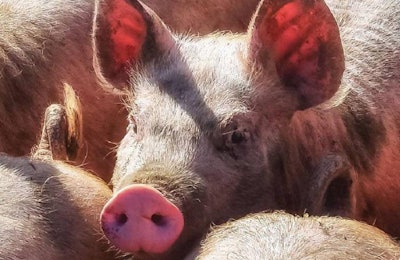
In recent weeks, domestic pigs on 2 South Korean farms and in backyards of Russia’s Far East have tested positive for the African swine fever (ASF) virus.
This week, two pigs at a farm in South Korea tested positive for the African swine fever (ASF) virus. Culling of the herd — around 1,700 animals — was underway, reported Yonhap. The affected premises is located in the county of Inje in the northern province of Gangwon, where previous ASF cases have been registered in wild and domestic pigs.
Just one week previously, the infection was confirmed at a farm in Goseong county in the same province, according to the news agency. This was the country’s first outbreak in pigs since May. Around 2,400 animals at the premise were culled as a preventative measure. A 48-hour nationwide ban on pig movements was immediately imposed. Subsequent tests on more than 200 pig farms within a 10-kilometer radius returned no further results positive for the ASF virus.
In 2019, ASF spread widely within Gangwon and neighboring Gyeonggi province, reports Yonhap. With 14 farms found to be infected, around 400,000 pigs were culled across the country in that year.
In late 2020, two more farm outbreaks were registered. Together with the three positive premises so far this year, the country’s total outbreaks in domestic pigs stands at 19.
First wild boar cases in previously ASF-free county
With the expanding activities of wild boar born this year, South Korea’s authorities have been preparing for a spike in ASF cases. According to the United Nations’ Food and Agriculture Organization (FAO), measures include limiting the movement of wild boar, and urging farmers to increase biosecurity.
As of August 2, 1,505 wild boar in the country have tested positive for the ASF virus since September 2019, according to the FAO. At the end of July, the first two cases were detected in wild boar carcasses in Pyeongchang. These brought to 11 the number of counties where the disease has been confirmed in the wild population of Gangwon province.
Nine new outbreaks in Russia’s Far East
Since the start of this month, Russian veterinary authority has officially registered ASF outbreaks among nine backyard herds in the Far Eastern federal district. Directly affected through mortality or culling were 263 pigs, according to reports to the World Organisation for Animal Health (OIE). Six of these latest outbreaks were in the district of Khabarovsk, two in Primorsky, and one in Amur. The largest herd to be affected numbered 23 animals.
ASF was first detected in this federal district two years ago. Until earlier this year, a total of 211 outbreaks in wild boar and domestic pigs in the region were registered with the OIE. These directly impacted almost 7,800 animals, both domestic and wild.
So far this year, 19 outbreaks in the Far Eastern district have been registered with the OIE, affecting 426 pigs. No new cases have been reported in wild boar.
India: ASF ‘serious threat’ in Assam
In the northeastern state of Assam, ASF is described as a “serious threat” in the one district, reported Sentinel Assam at the end of last month. In the Baksa district — which is in the northwest of the state and borders Bhutan — at least 40 cases of the disease had been detected in pigs. These animals were culled in the village of Karipara, where 44 pigs had died, and had tested positive for the ASF virus.
Around the same time, the disease was suspected in the district of Sivasagar, which is in the east of Assam and shares a frontier with Myanmar. A government-run farm in the district has been empty for some time after all its pigs died or were culled as a result of ASF.
FAO reports that 10,000 pigs have died in Assam state due to ASF since March. This year, cases have also been registered in the states of Manipur, Meghalaya, Mizoram and Nagaland.
ASF challenges continue in the Philippines
As the national veterinary authority retrospectively registered cases of ASF from last year with the OIE, the country’s challenges to control ASF are ongoing.
Additionally, 503 pigs on the island of Luzon were involved in an outbreak from December 2020 in an official report this month. With the most recent cases from December 17, outbreaks were in the provinces of Nueva Vizcaya, Cagayan, Quirino and Isabela.
While the results of an efficacy trial of a new ASF vaccine are awaited at the end of the month, reports the Philippine News Agency (PNA), the country’s agriculture secretary has stated that the government aims to offer free vaccination to all 9.7 million pigs in the country. A decision on future vaccination will be made by the end of this year.
In the Eastern Visayas region, PNA reported that 42 towns and cities registered new cases of the disease in just one week this month. By the end of July, the number of pigs culled had reached almost 13,700, which is 6% of the region’s total headcount. In January, Leyte was the region’s first province to report ASF cases.
In the province of Negros Occidental, recent clampdowns on illegal pork consignments have brought the year’s seizures so far to more than 900 kg, reports the same source. Efforts to prevent products potentially infected with ASF are credited with the Western Visayas region’s continued status as ASF-free.
ASF blamed for continued high pork prices
PNA reports that, because of the ongoing ASF situation, pork prices remain high in the Philippines.
In July, the year-on-year rise was 38%, but this was down from the June figure of 49%. A presidential order allowing increased imports and lower tariffs is expected to continue to push prices down during the second half of this year.
Two Filipino regions move toward hog repopulation
After periods of time without any ASF cases, first tentative steps are being taken toward repopulation with pigs, according to PNA.
In the Central Luzon province of Bulacan, a government-sponsored sentinel program has been launched. To benefit, farmers will need to pass a strict biosecurity audit, and deliver two ASF virus-negative tests within a two-week period.
Meanwhile, the agriculture department for the Cordillera Administrative Region has been holding farmer livestock schools in rural villages. These advise on all aspects of biosecurity. Afterwards, eligible attendees are provided with one sow, protective clothing and sanitation products as the first step in repopulating the region.
Latest reports to the OIE indicate that no new cases of ASF have been identified in Malaysia for at least two months.
View our continuing coverage of the global African swine fever situation.

















